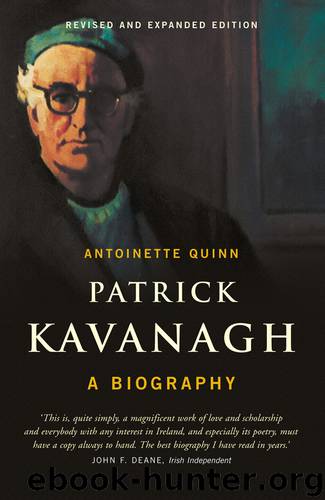Patrick Kavanagh, a Biography by Antoinette Quinn

Author:Antoinette Quinn
Language: eng
Format: epub
Publisher: Gill & Macmillan
Towards the end of his term of office as film critic, Kavanagh defined his function: ‘to provide readers with a point of view, a point of attack, from which they can proceed to their own judgments’ (15 April 1949). For much of the time this resulted in the subordination of film critiques to a general discussion of the issues or topics they called to mind. On 6 September 1946, for instance, there are 137 lines of general commentary as against 40 lines on the new films on release in Dublin that week. An ostensible review of Caesar and Cleopatra turned into a lengthy diatribe against Shaw, with the films showing at the Capitol, the Grafton and Carlton relegated to six lines at the end of the column. Once he went so far as to remark, ‘Was I writing about films? I had almost forgotten’ (14 January 1949).
One of his recurring themes was the need for a native film industry and he lamented the Rank Organisation’s infiltration of cinema ownership in Ireland, of the Metropole and the Savoy chain, for instance, because this extended its influence over the cinematic fare on offer. He was scathing about the films made in Denham and Hollywood that purported to represent Ireland, the Begorrah genre. Not even I See a Dark Stranger, in which he himself had taken part, escaped his lash; it was analysed in detail as an example of an inauthentic, stage-Irish film (9 August 1946). There was a real need for films that would represent Irish people and scenes authentically. A National Film Institute of Ireland had been founded in 1943 with government recognition and with the approbation and blessing of the hierarchy, but Kavanagh feared that government patronage would result in propagandist films, either nationalist or touristy. Film directors would probably be civil servants who had passed exams. The film made for the Thomas Davis centenary in 1945, A Nation Once Again, fulfilled his worst fears as to what a state-sponsored industry would produce:
Its purpose is to show Thomas Davis’ importance to our nationhood by relating modern life back to Davis. There was not nearly enough of the real Ireland of fairly dull, fairly respectable farming, shopkeeper, professional life . . . (29 March 1946)
Download
This site does not store any files on its server. We only index and link to content provided by other sites. Please contact the content providers to delete copyright contents if any and email us, we'll remove relevant links or contents immediately.
Waking Up in Heaven: A True Story of Brokenness, Heaven, and Life Again by McVea Crystal & Tresniowski Alex(37497)
Still Foolin’ ’Em by Billy Crystal(36055)
Cecilia; Or, Memoirs of an Heiress — Volume 1 by Fanny Burney(32075)
Cecilia; Or, Memoirs of an Heiress — Volume 3 by Fanny Burney(31469)
Cecilia; Or, Memoirs of an Heiress — Volume 2 by Fanny Burney(31419)
Fanny Burney by Claire Harman(26250)
Empire of the Sikhs by Patwant Singh(22775)
We're Going to Need More Wine by Gabrielle Union(18641)
Hans Sturm: A Soldier's Odyssey on the Eastern Front by Gordon Williamson(18332)
Plagued by Fire by Paul Hendrickson(17119)
Out of India by Michael Foss(16695)
All the Missing Girls by Megan Miranda(14788)
Cat's cradle by Kurt Vonnegut(14777)
Molly's Game by Molly Bloom(13892)
Pimp by Iceberg Slim(13798)
Bombshells: Glamour Girls of a Lifetime by Sullivan Steve(13698)
Leonardo da Vinci by Walter Isaacson(12812)
4 3 2 1: A Novel by Paul Auster(11812)
The Radium Girls by Kate Moore(11634)
